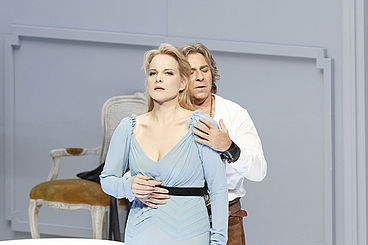 A modern dress Samson et Dalila at Vienna State Opera, in a German director’s (Alexandra Liedtke’s) new ‘concept’? In fact, Camille Saint-Saën’s opera (Ferdinand Lemaire’s libretto from Voltaire’s ) is no religious work. Saint-Saën’s gives us only an excerpt from the biblical narrative: the love story. It’s a drama concerned with relationships, questions of faith and duty. A psychological drama rather than a biblical blockbuster.
A modern dress Samson et Dalila at Vienna State Opera, in a German director’s (Alexandra Liedtke’s) new ‘concept’? In fact, Camille Saint-Saën’s opera (Ferdinand Lemaire’s libretto from Voltaire’s ) is no religious work. Saint-Saën’s gives us only an excerpt from the biblical narrative: the love story. It’s a drama concerned with relationships, questions of faith and duty. A psychological drama rather than a biblical blockbuster.
So the minimalist sets (Raimund Voigt) are merely functional. Philistine soldiers, elegantly dressed in silver grey tunics and black-stockinged, stand guard on a sloping ramp: beneath them, the Hebrews chorus sing, Oh, God of heaven, hear the prayers of your children. These down-trodden people, sitting in despair with their possessions, are like Mediterranean refugees of our time; vanquished. Samson – it must be him of the long hair- but Robert Alagna’s is not exceptionally long, rather coiffed. He picks up the Israelites’ prayer books, and raises one on high: our people have lost everything, even the name of Israel.
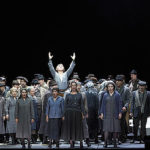 Alagna, in a belted jacket, shirt open-necked, sings like a modern Messiah: Stop, brethren, in the name of God, forgiveness is dead; the voice of God operates through him. Alagna looks remarkably young and sings, his golden tenor, with thrilling vigour.
Alagna, in a belted jacket, shirt open-necked, sings like a modern Messiah: Stop, brethren, in the name of God, forgiveness is dead; the voice of God operates through him. Alagna looks remarkably young and sings, his golden tenor, with thrilling vigour.
Who dares to raise their voices – they, the slaves seeking to break their chains? Mean-looking, baritone Carlos Alvarez, the High Priest of Dagon, wears a white smock, and over it a long black frock coat. He taunts the Jews, you are supposed to be the chosen ones, the ‘Children of Israel’.
Defiantly, Alagna, his arms raised incites revolt: Israel break your chains. There’s tremendous choral singing from Vienna State Opera Chorus. A blind man, Dan Paul Dumitrescu, as the wise old Hebrew – bearded, a tangle of white hair – walks on with his sticks: the Israelites hold up candles. They sing a hymn of joy, an anthem of deliverance.
Then Dalila (Elīna Garanča) appears; she sings she’s come to celebrate the victor who has conquered her. The cool Latvian beauty, her hair honey-gold, in a white blouse, ruffed black skirt adorned with a huge rose, is seduction itself. But, off-stage, Dumitrescu’s blind Hebrew prophet warns, avoid the sweet poison of the serpent!
Alagna sings of her kisses, sweeter than the lily of the valley. Then, riven by conscience, appeals, Come to me, O Lord. On the sloping stage platform, she teases him with her temptation; and around them, beneath the ramp, dance erotic Spanish dancers (Vienna State Ballet) sensationally choreographed (Lukas Gaudernak.) 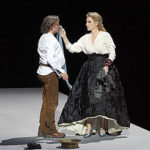
His shirt open, bare-chested, her skirt loosened, ‘the beginning of spring fills lovers with hope’. His breath effaces all traces of unhappy days, she sings. Then, hope quickens her sad heart; as if pining, she waits for him weeping, sung by Garanča with tender sadness. But as they, finally, kiss the old prophet warns of an evil spirit who occupies this woman, her glances a poison that will destroy him.
Act 2, the seduction. There’s a narrow aperture, a neon-bordered door on a blacked-out stage. Garanča sits curled up like a baby doll in a pale blue gown. In Dalila’s aria, she awaits Samson, awaits the hour of vengeance. To pour poison into his breast. To vanquish Samson so he will be in chains. He belongs to her: he is her slave! Against love, he is powerless: even he!
On the revolving stage, the high priest Alvarez, in a louche black silk dressing gown, with gold commerband, smoking a cigarette. The god Dagon has sought her out. (The Hebrews have taken the town with an easy victory.) They are framed by a white door, half-opened, in close physical proximity, as if they are lovers. Alvarez, in a subtly characterised performance, eats an apple- obviously symbolic of Satan’s temptation- and throws away the pips. The plan is to dis-empower him. She’d tried three times to discover Samson’s secret. Garanča undoes her shoulder straps; she will feign her love.
Now on the full stage, a luxurious Empire period bathroom- the stucco walls dove grey, polished parquet floor; a traditional bath tub centre stage. Late 19th century Paris, suggestions of a lovers’ assignation in a grand hotel, or luxurious bordello.
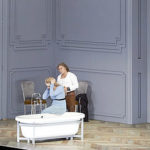 He returns malgre his will: curses his love, but cannot do without. – It is you my beloved, I have been expecting you. Greetings my sweet.- He’s to pay a last farewell. He’s called to duty. Israel awaits him with fresh hope! His Lord has spoken to him. – ‘The Chosen One?’ She mocks his faith. She torments him: obey the grand commandment. But for her, a stronger god speaks to her, the god of love.
He returns malgre his will: curses his love, but cannot do without. – It is you my beloved, I have been expecting you. Greetings my sweet.- He’s to pay a last farewell. He’s called to duty. Israel awaits him with fresh hope! His Lord has spoken to him. – ‘The Chosen One?’ She mocks his faith. She torments him: obey the grand commandment. But for her, a stronger god speaks to her, the god of love.
Alagna, in a billowing white shirt, a long pendant hanging to his waist, and wearing tight gold pants, looks somewhat like a 70’s rock star. But they – except Robert Plant- didn’t attain such resounding high notes.
Garanča is supreme in her aria Mon coeur s’ouvre à ta voix.. (My heart opens to the sound of your voice… But speak to me once more to drown my tears: reciprocate my feelings,beloved. Garanča’s supple mezzo is deep and richly sensuous. But there’s an ambiguity to her Dalila: a poignancy suggesting that she’s fallen for her bait.
Alagna seems to immerse his torso in that -we hope- warm bath. She opens the door (secretly lets Alvarez in.) Alagna sings of the storm unleashing its fury; coward, she taunts him. Drum rolls simulate thunder. The entire stage leaks water. They roll over in passion. This way. Alvarez sneaks in (with his scissors.) Treachery!
Act 3 is Alagna’s. Samson, now blinded- Alagna in a bloodied, torn shirt, crumpled pants, walks towards us, his eyes reddened. In his aria- tremendously powerful- desperate, lost, he offers his everything: he has to redeem himself, and save his people. Yet he’s on a platform, like a cat-walk, in the middle of a night club?! Crawling, clawing his way on a huge table, the guests in dinner wear mock him. He looks up, listens to the reproaching voices of the Hebrew chorus. 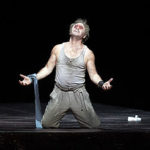
The chorus (of dinner guests) sing, beautifully, morning breaks over the hills: love helps us forget our suffering . Yet they’re a self-satisfied bourgeoisie, like a stereotypical opera audience.
Now a sensational ballet is played out on this narrow table, to Saint-Saens’ gorgeously evocative music: a young man, in the Samson role, is baited and bloodied. In the allegory, undressed to his underpants, he’s led away on a dog lead.
Garanča appears, like a high priestess, in a long, waisted, black gown, cut-open with black lace. Dalila sings of a regret- is she perhaps contrite? – remember my tender embraces and tenderness, sung to echoes of the great love theme. But she retracts, Samson served her plan to be avenged: her god, her people, and her hatred.
Samson, penitent, sings, as you spoke to me, I was deaf to you, oh Lord. Alvarez’s High Priest taunts him, if his lord were omniscient, he would avenge him. (The chorus, sing mockingly: you see nothing, your anger is funny.) He’s to be lead into the middle of the temple before his people.
Oh, lord, light my way and do not desert me. Alagna’s Samson is transformed: he stands defiantly. A fire-eater stands behind him- remarkable- his arms alight. The whole stage erupts in flames.
But is that all ? An anti-climax, against expectations of monumental walls crumbling down…But not in this script. The music, however- Saint-Saëns spectacular exoticism – says it all.
Marco Armiliato conducted Vienna State Opera Orchestra and Chorus- the first performance here in 24 years- in this, Saint-Saëns’s, neglected masterpiece.
© P.R. 18.05.2018
Photos: Elina Garanča (Dalila) and Roberto Alagna (Samson); Roberto Alagna (Samson) and Chorus; Elina Garanča (Dalila) and Roberto Alagna (Samson); Roberto Alagna
© Wiener Staatsoper/ Michael Pöhn
